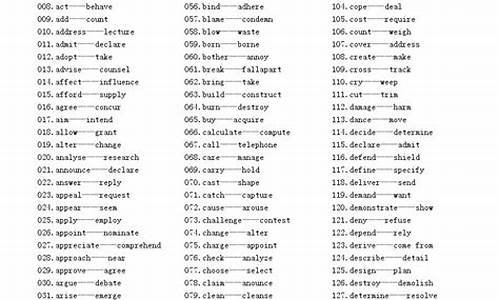您现在的位置是: 首页 > 教育改革 教育改革
英语高考近义词_高考词汇近义词
tamoadmin 2024-05-17 人已围观
简介above 在……上 below 在……下 after 在……后 before 在……前 all 全部 none 全无 alone 单独地 together 一起 always 总是 sometimes 有时 answer 回答 ask 询问 answer 答案 question 问题 back 背部 front 前面 bad 坏的 good 好的 badly 恶劣地 well 很好地 begin

above 在……上 below 在……下
after 在……后 before 在……前
all 全部 none 全无
alone 单独地 together 一起
always 总是 sometimes 有时
answer 回答 ask 询问
answer 答案 question 问题
back 背部 front 前面
bad 坏的 good 好的
badly 恶劣地 well 很好地
begin 开始 end, finish 结束
best 最好的 worst 最坏的
better 更好的 worse 更坏的
big 大的 small, little 小的
black 黑的 white 白的
borrow 借入 lend 借给
both 两者都 neither 两者都不
break 打破 mend, repair 修理
busy 忙碌的 free 空闲的
buy 买(入) sell 卖(出)
certainly 当然地 perhaps, maybe 或许;大概
cheap 便宜的 expensive, dear 昂贵的
clean 干净的 dirty 肮脏的
clever 聪明的 foolish 愚蠢的
cloudy 天阴的 bright, clear, sunny 晴朗的
cold 寒冷的 hot 炎热的
come 来 go 去
cool 凉爽的 warm 温暖的
danger 危险 safety 安全
dark 黑暗的 bright, light 明亮的
day 白天 night 夜晚
dead 死的 alive, living 活的
death 死亡 life 生命
die 死去 live 活着
down 向下 up 向上
dry 干燥的 wet 潮湿的
early 早的 late 迟的
easy 容易的 difficult, hard 困难的;艰巨的
empty 倒空 fill 装满
empth 空的 full 满的
entrance 入口 exit 出口
fall 落下 rise 升起
far 远的 near 近的
fine 晴朗的 cloudy, rainy 天阴的;下雨的
finish 结束 begin, start 开始
first 最初的 last 最后的
foreign 外国的 home 本国的
forget 忘记 remember 记得
from 从…… to 到……
give 给予 take 拿走
glad 愉快的 sad, sorry 悲伤的;难过的
good 好的 bad, ill, poor 坏的;恶劣的
great 伟大的 little, small 渺小的
happy 高兴的 unhappy, sad 难过的
hard 艰难的 easy 容易的
hard 硬的 soft 软的
hate 憎恨 love, like 热爱;喜欢
here 在这里 there 在那里
high 高的 low 低的
hold 拿住 drop 掉落
holiday 假日 weekday 工作日;平时
ill 生病的 healthy, well 健康的
in 在里面 out 在外面
inside 在里面 outside 在外面
into 到……里面 out of 从……里向外
kill 杀死 save 救活
laugh 笑 cry 哭
leave 离开 arrive 到达
leave 离开 stay 逗留
light 明亮的 dark 黑暗的
light 轻的 heavy 重的
like 喜欢 hate 憎恨
like 与……一样 unlike 与……不一样
lose 丢失 find 找到
lose 失败;丢失 win 胜利;赢得
many 许多 few 很少
miss 未抓住;未赶上 catch 抓住;赶上
miss 未击中 hit 击中
more 更多的 less, fewer 更少的
most 最多的 least, fewest 最少的
move 移动 stop 停止
much 许多 little 很少
never 从未 ever 曾经
next 下一个 last 上一个
nobody 无一人 everybody 每个人
nothing 什么也没有 everything 一切
now 现在 then 当时
old 旧的 new 新的
stay、remain和keep辨析
1.表示“继续呆在某处”时,应该用不及物动词remain或stay,例如:
Shall I go or stay?
Stay indoors for a few days until you recover from your cold.
He remained in his seat after all the other students had gone home.
2.表示“暂住、短期停留”时,只能用不及物动词stay。例如:
He is staying at Hilton Hotel.
My mother-in-law stayed with us this week when she visited us.
3.表示“残留、剩下”时,只能用不及物动词remain,例如:
Not much of the house remained after the fire.
Of the seven brothers, only four now remain; the rest are dead.
4.表示“继续保持或处于某种状态”时,应视具体情况在上述动词中进行选择:
(1)表示“继续保持或处于原来的状态”时,可用remain或stay,例如:
Three of them remained single.Shops should remain open till later in the evening.
The door stayed closed.But the police themselves prefer to stay unarmed.
(2)表示“需要设法才能保持或处于某种状态”时,应用keep,例如:
She knew she must keep calm. I wish those children would keep quiet.
Although they have many difficulties, they keep happy.
Paul managed to keep awake by drinking lots of strong black coffee.
(3)表示“使某人或某物保持某种状态”时,只能用及物动词keep,例如:
She had kept him waiting twenty minutes on this occasion.
Why do you always keep your windows closed?









